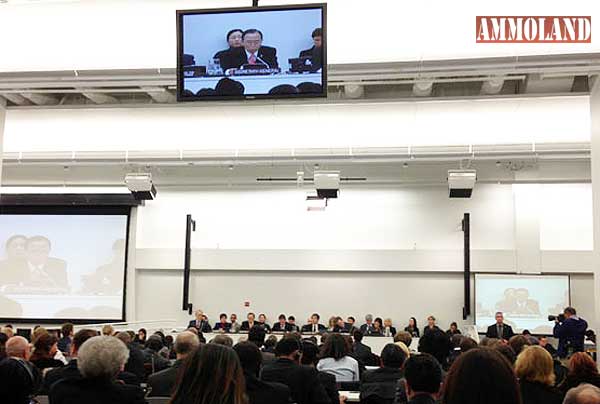By Ted R. Bromund, Ph.D.


Washington, DC –-(Ammoland.com)- The fireworks at the U.N. Arms Trade Treaty (ATT) conference in New York started late on Wednesday.
By Thursday afternoon, the atmosphere, which had in previous days been calm, felt like last July, when the last negotiating conference collapsed into failure.
The fun began with an intervention on Wednesday by Germany, speaking on behalf of the EU, and asking —begging, really— for the EU to have the right to sign the treaty. Because the national interests in the EU are too diverse to allow it to settle on a common negotiating position, all the EU wants is the pathetic validation of its own existence that would derive from signing the treaty. It’s not in the room to achieve anything substantive.
Soon after Germany came China, which, in a smoothly hostile speech, announced that, while it was a firm supporter of the EU and that the 1.3 billion citizens of China were glad to assist the euro —a not-too-subtle reminder of the EU’s weakness and need for foreign purchasers of European debt— it could not allow the EU to sign the ATT. With obvious pleasure, the Chinese delegation twisted the knife by saying that it would gladly allow other regional groups to sign the treaty but not the EU. China did not need to say why it opposes an EU signature. Everyone in the room knows why: The EU, thanks to U.S. and British pressure, maintains a post–Tiananmen Square arms embargo on China.
This speech caused an audible reaction around the room, halfway between suppressed laughter and a gasp.
The national speeches stopped early on Wednesday to allow the conference president, Peter Woolcott of Australia, to distribute his first revised draft of the treaty. Woolcott’s public handling of the conference has been consummately professional: Sessions start on time, documents arrive when promised, and his explanations are clear and cogent. In keeping with his previous promise, his revisions on this draft were minimal and made mostly for the sake of legal clarity. Some were good (the addition of the word international throughout Article 1 to make it clearer that the treaty applies only to international trade), and some were bad (the removal of international from Article 3.4, which muddied the waters all over again), but the overall effect was modest.
The most consequential change was the more complete removal of ammunition and parts and components from the treaty’s scope. This caused heartburn on the part of the holier-than-thou brigade, led by Norway and New Zealand, and for once they had a point: The revised wording appeared to impose obligations considerably weaker than the U.S. system, which the Administration has vowed to preserve and to use the treaty to advance. But in a forceful but informal intervention —no one else calls the rest of the delegates “folks”— on Thursday, U.S. Ambassador Don Mahley made it crystal clear that the U.S. would not accept the inclusion of ammunition in the formal scope of the treaty and that it had grave reservations about several other aspects of the draft text.
But as important as Mahley’s remarks were, they took second place to the ongoing —if one-sided— battle between the EU and China. The EU rattled the begging bowl again on Thursday morning, with a mealy-mouthed statement that it was “regrettable that unrelated issues” (meaning the arms embargo) were being involved in the ATT negotiations. That’s untrue: The embargo is obviously related to a multilateral treaty on the arms trade, as everyone recognizes.
China replied immediately, assuring everyone of its support (which in truth is barely perceptible) for the ATT, scolding the holier-than-thou brigade for chasing a perfect treaty at the expense of a consensus text, and concluding —obviously off the cuff— with the following comment, delivered with tremendous sarcasm:
“Just now, I heard remarks by a delegation on EU membership [i.e., signature of the treaty]. They were so beautiful! But not beautiful enough to change my mind. But I thank him for his efforts.”
That was not particularly diplomatic. It’s good manners at the U.N. to pretend that your remarks are addressed to the conference president, not to any other national delegation. But it was funny, and this time a wave of laughter swept the room.
As the reactions to the first revised draft continued, China strangely stood alongside the U.S. as the two countries in the room that were not afraid to do a little plain speaking. As for the EU, it was heard from no more.
About Heritage Foundation
The Heritage Foundation is the top conservative think tank in the United States. Their blog starts your morning off right with “The Morning Bell,” a blogpost that brings you up to speed on current issues, and then updates you throughout the day on a variety of issues concerning conservatives. Visit: https://blog.heritage.org
About Ted R. Bromund, Ph.D.:
Ted R. Bromund studies and writes on British foreign and security policies and Anglo-American relations as senior research fellow in The Margaret Thatcher Center for Freedom. He also explains why America must defend and advance its unique leadership role in the world. Visit: https://blog.heritage.org/author/tbromund/ to read more.





